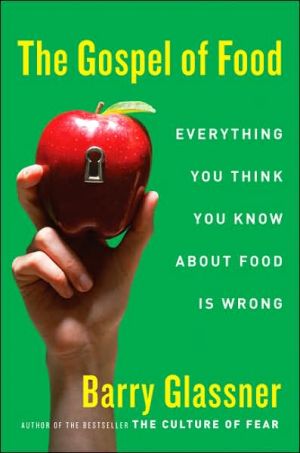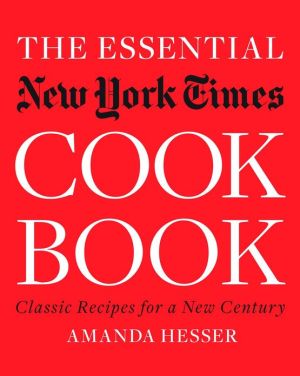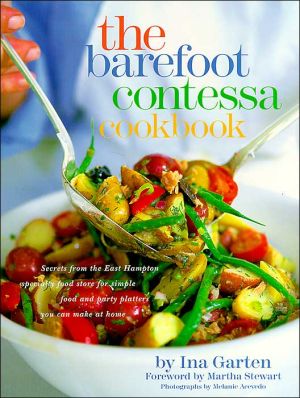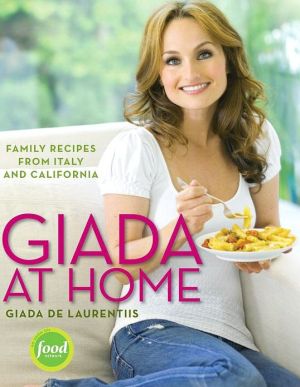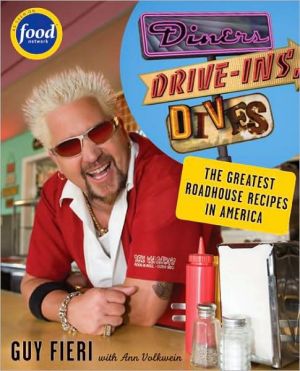Gospel of Food: Everything You Think You Know About Food Is Wrong
Enjoy what you eat.\ From the author of the national bestseller The Culture of Fear comes a rallying cry to abandon food fads and myths for calmer and more pleasurable eating.\ For many Americans, eating is a religion. We worship at the temples of celebrity chefs. We raise our children to believe that certain foods are good and others are bad. We believe that if we eat the right foods, we will live longer, and if we eat in the right places, we will raise our social status. Yet what we believe...
Search in google:
Enjoy what you eat. From the author of the national bestseller The Culture of Fear comes a rallying cry to abandon food fads and myths for calmer and more pleasurable eating. For many Americans, eating is a religion. We worship at the temples of celebrity chefs. We raise our children to believe that certain foods are good and others are bad. We believe that if we eat the right foods, we will live longer, and if we eat in the right places, we will raise our social status. Yet what we believe to be true about food is, in fact, quite contradictory. Offering part expose, part social commentary, sociologist Barry Glassner talks to chefs, food chemists, nutrionists, and restaurant critics about the way we eat. Helping us recognize the myths, half-truths and guilt trips they promulgate, The Gospel of Food liberates us for greater joy at the table. The New York Times - Kim Severson … like a magician with a long act and a few great tricks, Glassner makes it worth sitting through the obvious sleight of hand to get to the good parts. In his book s strongest section, he argues against the conventional wisdom on the causes of obesity: that we eat too much and don t exercise enough. A master at the art of dissecting research, he points out that the obesity epidemic and he s not entirely convinced there is one, or that being overweight is taking years off people s lives came about through a complex mix of genetic predisposition, economic hardship and antismoking campaigns.
The Gospel of Food\ Everything You Think You Know About Food Is Wrong \ \ By Barry Glassner \ HarperCollins Publishers, Inc.\ Copyright © 2007 Barry Glassner\ All right reserved.\ \ \ \ Chapter One\ False Prophets\ Culinary Correctness Gone Awry\ The word "enjoy" appears in the official dietary guidelines issued by the governments of Britain, South Korea, Thailand, and Australia. Norway comes right out and declares, "food and joy = health." The United States' dietary guidelines, faithful to our Puritan roots, say nothing about enjoyment.\ It's high time we correct that omission. People get more out of a meal, not just emotionally, but physiologically, when the food is a pleasure to eat. In one of my favorite studies, Swedish and Thai women were fed a Thai dish that the Swedes found overly spicy. The Thai women, who liked the dish, absorbed more iron from the meal. When the researchers reversed the experiment and served hamburger, potatoes, and beans, the Swedes, who like this food, absorbed more iron. Most telling was a third variation of the experiment, in which both the Swedes and the Thais were given food that was high in nutrients but consisted of a sticky, savorless paste. In this case, neither group absorbed much iron.1\ Similarly, studies of dieters find that those who regard pleasure as unimportant in their food choices enjoy their meals less and are more likely to be dissatisfied with their bodies and exhibit symptoms of eatingdisorders.2\ Then there's the much discussed French Paradox, the fact that the French eat a lot of what Americans believe will kill them, yet they die of heart attacks at about the same rate. The standard explanation, made famous in a 60 Minutes segment in 1991, credits wine drinking, but there's surely more to the story. Serge Renaud, who first brought the paradox to light and runs a research institute at the National Institute of Health in Bordeaux, suggests that another part of the answer lies in the types of fat the French consume. Goose and duck fat may do for the French what olive oil does for southern Europeans, Renaud hypothesized, namely, elevate their HDL ("good cholesterol"). Gascony has the lowest rates of heart disease in France, he noted, and people there eat a fair amount of foie gras.3\ As my grandmother used to say, from his mouth to God's ear. Imagine if our risk of heart disease dropped with every bite of the sautéed Moulard duck foie gras with pickled white nectarines, onions, and arugula that my wife and I feasted on at the French Laundry on a recent birthday, or the poached foie gras with a marmalade of greengage plums that I will never forget from another dinner there. More likely, any benefit to our health from Thomas Keller's wondrous cooking resulted from the happiness it brought us. Renaud's critics have appropriately pointed out that Gascons probably have other traits in common that protect them from heart attacks besides a fondness for foie gras.\ One candidate is their attitude toward eating. Paul Rozin, a psychologist at the University of Pennsylvania, organized a study in which 1,281 people in France, Japan, Belgium, and the United States were questioned about their attitudes toward food. Among the findings: the French view food as pleasure, while Americans worry about food. Asked what words they associate with chocolate cake, the French chose "celebration" and the Americans chose "guilt." Asked about heavy cream, the French selected "whipped"; Americans chose "unhealthy."4\ We Americans see pleasurable and healthy eating as mutually exclusive. In a survey in 2000, Newsweek asked readers whether they consider long-term health when planning their diet. The four answers the magazine offered--"yes," "not as carefully as I probably should," "I pay more attention to my weight," and "no, I enjoy life and eat what I want"--show how dreary and dichotomized the American view of eating has become.\ The results of the survey underscore the point. Fewer than one in four respondents selected "enjoy life."5\ A Satisfaction Not Easy to Attain\ We get that joyless view from nutrition writers and scientists who extol self-denial as a key to good health. "Spoil your appetite," Walter Willett, chair of the Department of Nutrition at Harvard, advises readers of his book on food and health. Have a snack of carrots or whole-grain wafers prior to mealtime, he recommends, so you don't eat as much at the table and risk gaining weight.\ Willett's book overflows with pleasure-busting suggestions. He proposes, for example: "You may eat less if your entire meal is a chicken dish and vegetables than if you prepare several tempting dishes."\ The very title of Willett's book announces that happiness is beside the point. Eat, Drink, and Be Healthy, he named it.6\ Willett follows in a long line of nutritional scientists who have regarded the pursuit of pleasure at the table as either immaterial to good health or downright detrimental. Writing in a popular magazine in 1902, a physician looked forward to the day when "man has conquered his palate and no longer allows it to dictate the quantity and quality of the things he swallows." In Literary Digest in 1913, a chemist went further still. "It would be a hundred times better if foods were without odor or savor, for then we should eat exactly what we needed and would feel a good deal better," he declared.7\ Present-day proponents of the doctrine of naught would banish some of nature's swellest edibles from our tables. The humble potato, for instance, is "part of the perilous pathway to heart disease and diabetes," according to Willett. A baked potato may look innocent enough, but it turns to glucose, he cautions, which produces dangerous surges in blood sugar and insulin. Instead of classifying potatoes as vegetables and encouraging people to eat them, as it currently does, the U.S. Department of Agriculture should call them carbohydrates and have us consume them only occasionally, Willett maintains.8\ Never mind that the potato was the principal source of sustenance in Ireland in the late eighteenth century and the early nineteenth century, providing most of the calories, protein, and vitamins that kept the peasant population alive. "Hard as is the fate of the labouring man, I think he is greatly indebted to the potato for his flow of spirits and health of body," wrote Asenath Nicholson, an American diet reformer who spent four years in Ireland in the 1840s and published her observations in a book titled Ireland's Welcome to the Stranger.9\ \ \ Continues... \ \ \ \ Excerpted from The Gospel of Food by Barry Glassner Copyright © 2007 by Barry Glassner. Excerpted by permission.\ All rights reserved. No part of this excerpt may be reproduced or reprinted without permission in writing from the publisher.\ Excerpts are provided by Dial-A-Book Inc. solely for the personal use of visitors to this web site. \ \
\ From Barnes & NobleOkay, you're stranded on a desert island with only water and one food from this list: spinach, corn, alfalfa sprouts, hot dogs, peaches, bananas, spinach, or milk chocolate. Which would you choose? The answer to this trick question is, of course, "hot dogs," but to find out why, you'll have to read Barry Glassner's merry muckraking book on food. In it, the author of The Culture of Fear demolishes all the myths we eat by, including "Fast food is bad for you," "Fish is good for you," "Organic food is better for you than regular food," and "Eating is as bad for you as smoking." Perfect mealtime reading.\ \ \ \ \ New York Times"Glassner exposes the strained interpretations, ‘prejudices dressed up as science,’ and pure fabrications behind much received wisdom."\ \ \ New York Times Book Review"A master at the art of dissecting research."\ \ \ \ \ Wall Street Journal"It’s hard not to root for Glassner as he tilts against modern food dogma."\ \ \ \ \ Los Angeles Times Book Review"Pure fun to read . . . Glassner is methodical and relentless in his exploration."\ \ \ \ \ Kim Severson… like a magician with a long act and a few great tricks, Glassner makes it worth sitting through the obvious sleight of hand to get to the good parts. In his book’s strongest section, he argues against the conventional wisdom on the causes of obesity: that we eat too much and don’t exercise enough. A master at the art of dissecting research, he points out that the obesity epidemic — and he’s not entirely convinced there is one, or that being overweight is taking years off people’s lives — came about through a complex mix of genetic predisposition, economic hardship and antismoking campaigns.\ — The New York Times\ \ \ \ \ Rachel Hartigan SheaIf Glassner preaches anything in The Gospel of Food, it is not to trust anybody's pronouncements about what to eat, be they from a scientist, nutritionist or well-respected diet guru. We just don't know enough about how food influences health, he argues. To prove his point, he calls up the then-president of the American Heart Association and asks him for "the percentage that diet contributes to heart disease." In other words, how large an influence is what you eat on the health of your heart? The response? "Wow. That's a very difficult question to answer, frankly." Nobody seems to know the answer.\ — The Washington Post\ \ \ \ \ Publishers WeeklyIn his latest debunking project (after The Culture of Fear), sociologist Glassner argues that "everything you think you know about food is wrong." And Glassner really does take on almost everything, from Atkins to vegans, with particularly hard jabs at those who, in the name of nutrition, take the fun out of food. This includes some well-known food writers, the manufacturers of "fat-free" foods, as well as "natural" and "organic" offerings-but surprisingly, he stands up for irradiated "Frankenfoods" and for some processed fast food. Later, he tackles the American obesity "epidemic." Here, too, he finds conventional wisdom more mythic than real, with so much conflicting evidence (the book is formidably researched and footnoted) that he finds himself wondering if obesity really matters and concludes that it probably doesn't, much. Only two conventional bits of wisdom survive Glassner's skeptical approach: the rich really are thinner than the poor, and four-star restaurant cooking really is delicious. Glassner's myth-busting information is useful, but at times he takes jabs in too many directions, losing narrative focus. (Jan. 2) Copyright 2006 Reed Business Information.\ \ \ \ \ Library JournalFrequent sensational headlines and scientific controversies about obesity, fast food, and food safety have left many Americans bewildered about what to eat. Glassner's (sociology, Univ. of Southern California; The Culture of Fear) well-researched and wide-ranging commentary on American eating habits and food-related beliefs offers a welcome antidote to such confusion by examining the veracity of numerous food myths. Casting his clear-eyed, critical gaze on restaurant reviewers, nutrition reformers, McDonald's critics, and corporate food marketers, Glassner succeeds in making a persuasive case that Americans take their concern over healthy eating to unnecessarily extreme levels. As he amusingly skewers one food fad after another, he advocates for a sensibly skeptical and moderate approach to food beliefs that will allow "greater joy and realism at the table." Likely to interest readers of Michael Pollan's The Omnivore's Dilemma, Marion Nestle's What To Eat, or Eric Schlosser's Fast Food Nation, this work is recommended for larger public and academic libraries.-Ingrid Levin, Florida Atlantic Univ. Libs., Jupiter Copyright 2006 Reed Business Information.\ \
